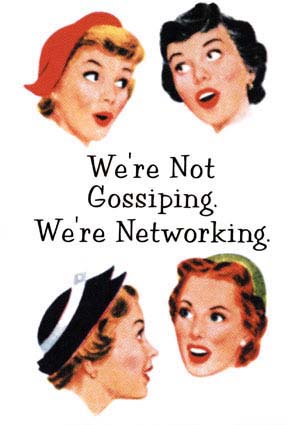
Gossip, Nobody's Friend
My name is gossip. I have no respect for justice.
I maim without killing. I break hearts and ruin lives.
I am cunning and malicious and gather strength with age.
The more I am quoted, the more I am believed.
I flourish at every level of society.
My victims are helpless.
They cannot protect themselves against me...
because I have no name and no face.
To track me down is impossible.
The harder you try, the more elusive I become.
I am nobody's friend.
Once I tarnish a reputation, it is never the same.
I topple governments and wreck marriages.
I ruin careers and cause sleepless nights,
heartache, and indigestion.
I spawn suspicion and generate grief.
I make innocent people cry on their pillows.
Even my name hisses. I am called gossip, party gossip,
Telephone/Internet gossip, and don't forget church gossip.
I make headlines and headaches.
Before you repeat a story,
ask yourself, is it true?
Is it fair?
Is it necessary?
If not, keep it to yourself!.
Let’s say you’ve just heard a juicy rumor about someone . It may not be true, but it’s too good to keep to yourself. Your first instinct is to hop online and IM it to all your friends. We’ve all had that kind of urge. But why? Here are some possible reasons:
To feel superior
When people are feeling bad about themselves, they sometimes think they’ll feel better if there were someone worse off than they are. It’s like, it’s okay being near the bottom, as long as they’re not actually on the bottom. The easiest way for them to make sure someone else is on the bottom is to make up a rumor that puts him or her there.
To feel like part of the group
If everybody else is gossiping or spreading rumors, you might feel you have to do the same thing in order to fit in. When you’re “in on the secret,” you’re in the group. Unfortunately, the person who the gossip or rumor is about is usually left out of the group for the same reason that you’re let into it.
For attention
When you know a secret that nobody knows, or are the first person in your group to hear a rumor, it can make you the center of attention. A rumor or piece of gossip is sometimes like money; telling it to people is like buying their attention, if only for a few minutes. You might even save up a really scandalous rumor, waiting for the right moment to blab so you get the maximum amount of attention
for it.
For control or power
Certain people always want to be in control and at the top of the ladder. You probably know at least one person who needs to be the leader, say what goes, and make all the decisions. When people are at the top of the popularity scale, or are determined to climb higher, one way they do this is by reducing the “status” of another person. Spreading rumors and gossip is one of the main ways people reduce another person’s status, especially among girls. It’s like one caveman beating up another caveman for control of the tribe…only it’s done with cruel whispers and petty remarks instead of fists.
Out of jealousy or a need for revenge
If you’re jealous of someone’s looks, popularity, or money, you might gossip about that person in order to hurt him or her. If you feel that someone’s done something bad to you, or deserves to be hurt, making up a rumor might satisfy your sense of justice.
Out of boredom
Did you know that in many studies, this was the #1 reason why young people say they spread rumors? Sometimes, a period where everyone is happy and getting along just seems kind of…dull. Spreading juicy dish might shake things up a bit, or get two people to start a fight, and that would make life a little more exciting. All those tabloid newspapers and TV shows full of celebrity gossip are pure proof that rumors are a popular form of entertainment.






No comments:
Post a Comment